Key takeaways:
- Reparations discussions emphasize the need for emotional acknowledgment of historical injustices beyond financial compensation.
- Key debates focus on who qualifies for reparations and the methods of delivery, highlighting the diversity of opinions within the community.
- Grassroots advocacy, education on historical contexts, and financial support for organizations are crucial actions to advance reparations movements.
- Future advocacy must embrace intersectionality and leverage technology to engage younger generations and broaden awareness.

Understanding reparations politics
Reparations politics encompasses not just financial compensation but also a broader acknowledgment of historical injustices. I remember attending a forum where a passionate speaker shared their family’s history of oppression. Hearing those stories made me realize how deeply intertwined our current social fabric is with past wrongs, and it left me questioning how society can truly heal without recognizing these roots.
The nuances of reparations can evoke strong emotions, and rightly so. During one discussion, a participant expressed tears of frustration about how reparations are often dismissed as unrealistic. It struck me that this emotional weight is crucial in understanding reparations. We can’t talk about numbers without addressing the pain behind them.
Engaging in reparations politics means examining what justice looks like for diverse communities. I often find myself pondering, is it enough to offer money? The conversations I’ve had suggest that many seek collective healing, community investment, and reparative measures that extend beyond mere financial restitution. This realization compels me to dive deeper into how reparations can be more than just a political issue; it’s about restoring dignity and agency to those long oppressed.
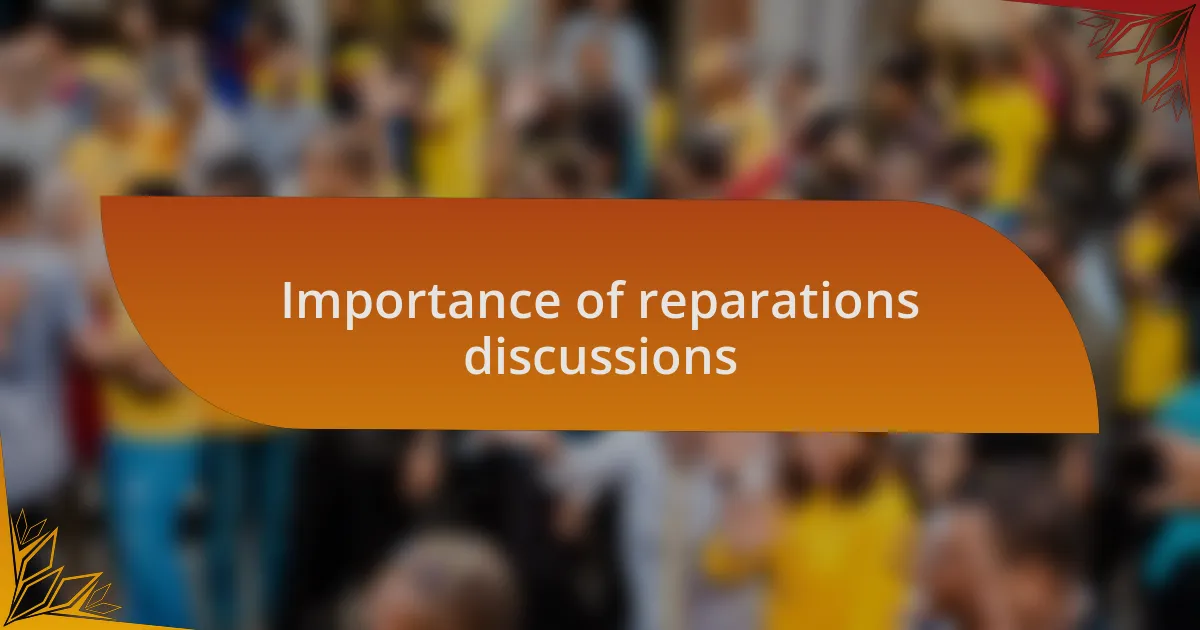
Importance of reparations discussions
Understanding the importance of discussions around reparations is essential. At one forum, I heard a survivor passionately recount their family’s experience with systemic racism, and it hit me: these discussions are not just abstract debates; they are real conversations about real lives. How can we expect progress if we don’t confront the emotional and cultural scars that linger?
I often reflect on how powerful storytelling can be in these conversations. One participant shared their bitter experiences with redlining and the loss of generational wealth. That moment crystallized for me how reparations must encompass more than money; they must address the historical context that shapes modern inequality. And who better to lead these discussions than those directly affected?
Moreover, fostering a safe space for these dialogues allows for healing and understanding. I remember the collective silence after a speaker’s haunting story, as we all grasped the weight of their pain. It made me question: what would it take for us to bridge the gap between acknowledgment and action? These conversations are vital for collective empathy, and without them, can we truly achieve justice?
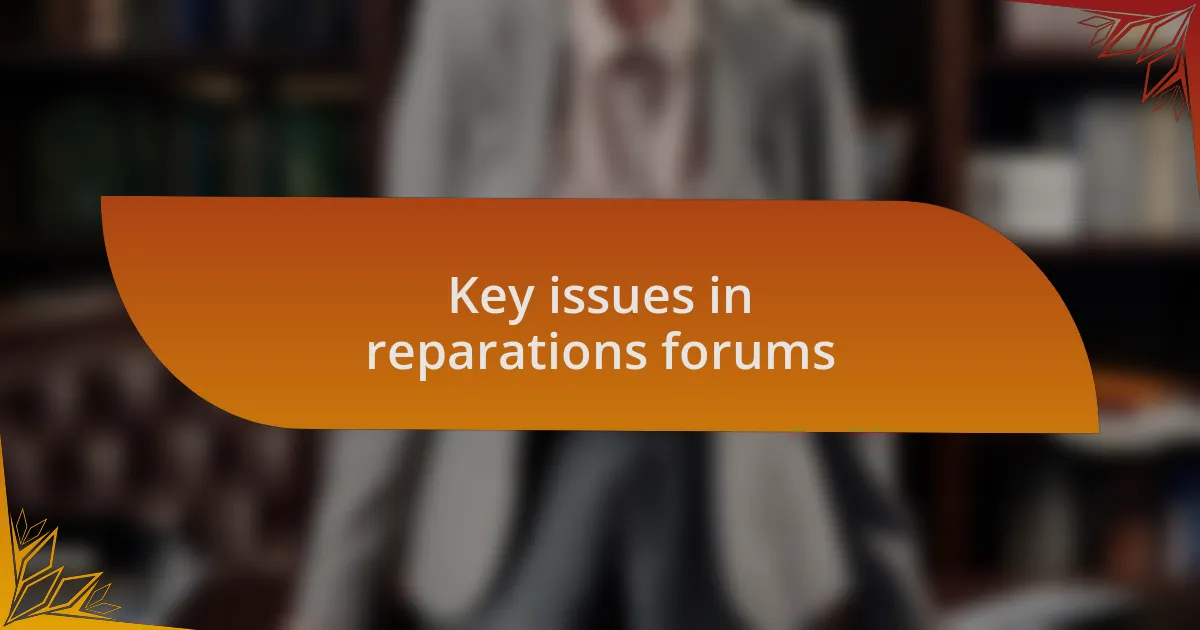
Key issues in reparations forums
One recurring issue in reparations forums is the question of who qualifies for reparations. I remember a heated discussion where various perspectives clashed; some believed only descendants of enslaved people should receive reparations, while others argued for broader criteria that include impacted communities. This debate made me wonder: how do we define “impact” in a way that honors everyone’s experiences without diluting the purpose of reparations?
Additionally, the methods of delivering reparations sparked much dialogue. During one session, I listened intently as panelists debated direct financial compensation versus programs aimed at education and health equity. It struck me how diverse opinions on this issue reflect our different values and priorities. Isn’t it fascinating how the form of reparations can change depending on who’s at the table?
Lastly, the discussion of accountability often emerged as a crucial topic. At times, I found myself frustrated by the reluctance of institutions to commit fully to reparative measures. It left me questioning: what does true accountability look like, and how can it drive systemic change? Reflecting on these moments made it clear that without transparency and genuine commitment to change, even the most well-intentioned discussions might fall flat.

Insights gained from attending forums
Attending the reparations forums opened my eyes to the power of collective storytelling. I noticed many individuals sharing personal narratives that connected their lived experiences to the broader injustices faced by their communities. Listening to these stories not only evoked deep empathy but also reinforced the importance of remembering history—how can we truly heal without acknowledging the pain that has shaped our present?
One striking takeaway for me was the diversity of strategies discussed. I vividly recall a passionate speaker advocating for community-led initiatives rather than top-down approaches. This made me reflect on the essential role of grassroots movements in pushing the reparations conversation forward. How often do we overlook the voices that come from within the communities that need reparations the most?
Finally, the forums challenged my understanding of urgency in reparations advocacy. A young activist shared their frustration over the slow pace of change, reminding me of the many barriers still in place. It got me thinking: what steps can we take right now to not only keep the conversation alive but also to push for tangible actions? The sense of urgency I felt in that moment has stayed with me, emphasizing that the fight for reparations is not just a historical issue but a contemporary one that demands our immediate attention.
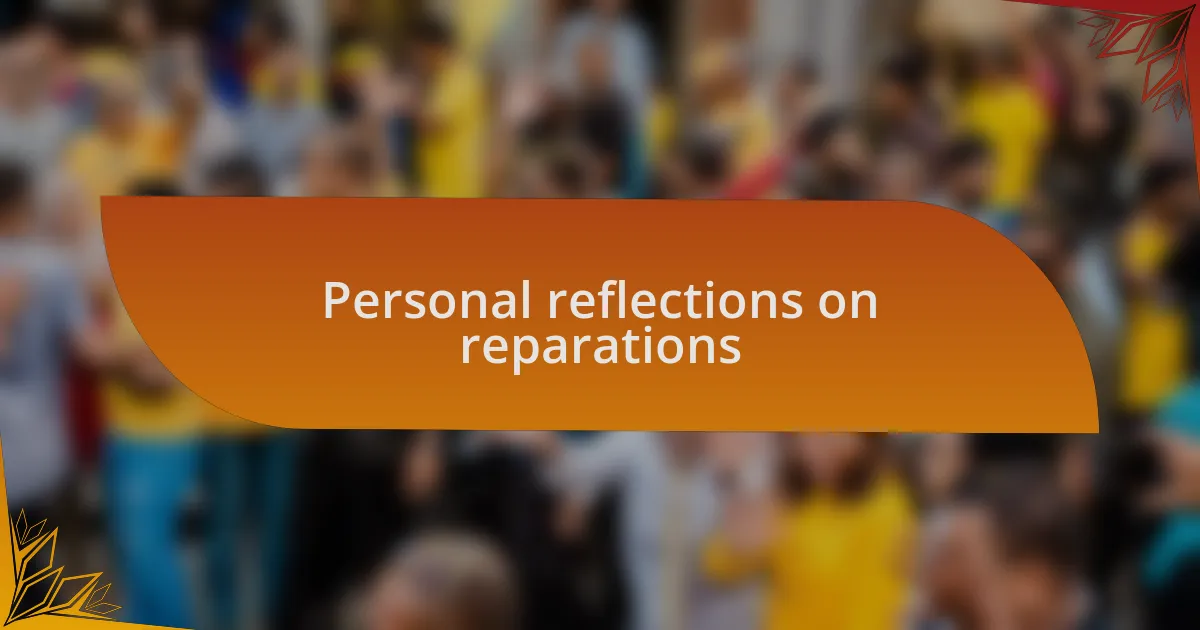
Personal reflections on reparations
Understanding reparations has become a profound journey for me. At one forum, I listened to an elder recount her family’s history, detailing how systemic injustices impacted generations. The weight of her words struck me—how could we ignore these legacies? I realized that reparations are not just about monetary compensation; they are about recognizing the full humanity of those affected and the historical trauma that lingers.
One moment that particularly resonated was when a young mother shared how the topic of reparations influenced her children’s education. She was determined to instill a sense of pride in their heritage, contrasting it against the erasure often experienced in schools. This made me ask myself: how can we empower future generations to understand their history while advocating for change today? Her passion sparked an emotional connection in me, pushing me to consider my role in this narrative.
As I reflected on the discussions at these forums, I felt an overwhelming sense of responsibility. Hearing diverse perspectives made me realize that reparations is a multifaceted issue, needing a variety of voices to guide the conversation. What role can I play in amplifying these voices? This awareness motivates me to engage more deeply and think about how my contributions can support a thoroughly inclusive dialogue about reparations.
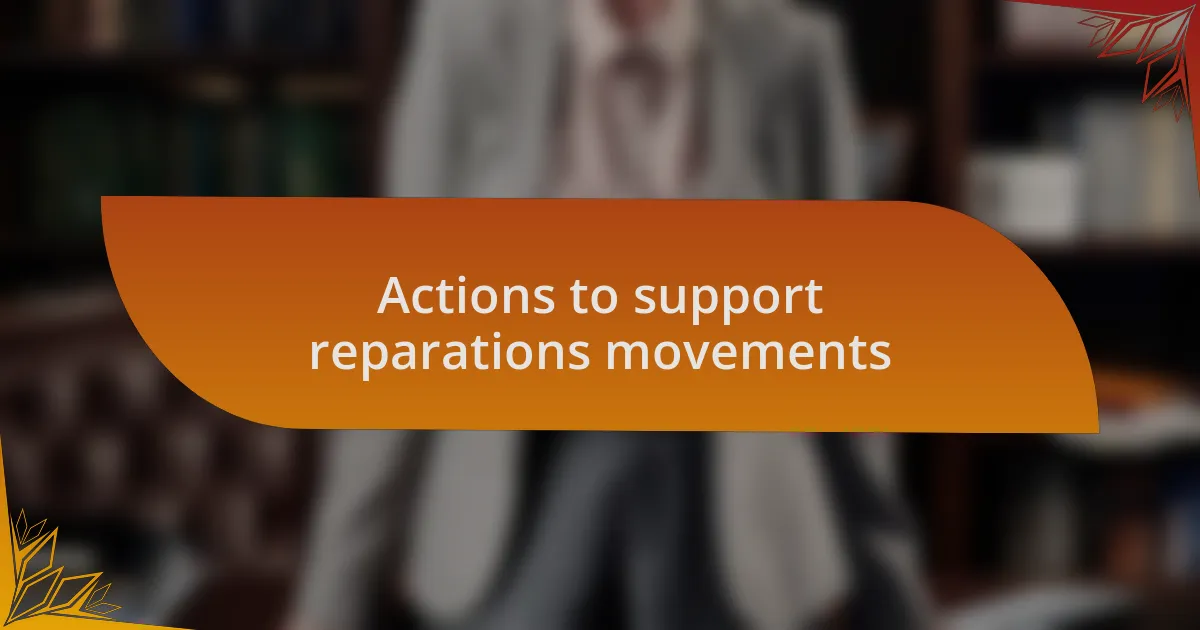
Actions to support reparations movements
One effective action to support reparations movements is to engage in grassroots advocacy. I remember attending a local meeting where community leaders laid out a clear plan to mobilize support for reparations legislation. Hearing their passionate discussions made me realize the importance of getting involved at the community level. It’s not just about policy change; it’s about building a collective voice that legislators can’t ignore.
Another impactful way to contribute is by educating oneself and others about the historical contexts underpinning reparations. At one forum, I learned about the intricacies of discriminatory policies and their long-lasting effects. This knowledge inspired me to host discussions within my own circle, emphasizing how awareness is crucial to fostering empathy and understanding. How can we advocate for justice if we don’t fully grasp what it entails?
Moreover, donating to organizations that focus on reparative justice can significantly enhance these movements. I recall my surprise when I discovered how many grassroots organizations actively provide resources and support for affected communities. Contributing financially not only helps sustain their efforts but also signals commitment to the cause. It’s a tangible way to show solidarity, but it also raises the question: how can we align our financial support with our values to make a real difference?
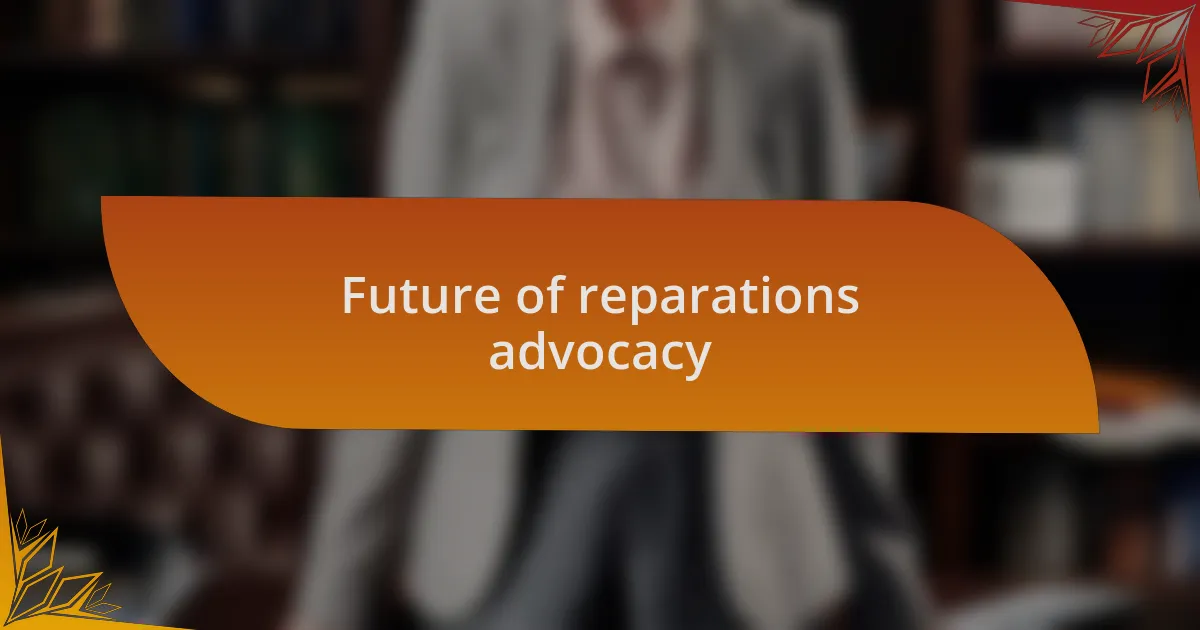
Future of reparations advocacy
The future of reparations advocacy is undoubtedly tied to the evolving conversations within our communities. I remember sitting in a recent virtual forum, where the energy was palpable as advocates from various backgrounds shared innovative approaches to engage younger generations. This dynamic exchange illuminated a critical question: how do we ensure that the discourse around reparations resonates with those who will carry the movement forward?
As the dialogue continues, I’m increasingly aware of the importance of intersectionality in our advocacy efforts. I’ve spoken with individuals who feel that their struggles intersect with others, creating a powerful coalition for change. It’s vital to ask ourselves: how can we broaden our understanding of reparations to include the diverse experiences of marginalized communities? This collective approach can strengthen our push for systemic change.
Looking ahead, I believe that leveraging technology will play a significant role in advancing reparations initiatives. After attending a workshop on digital activism, I was struck by how social media can amplify voices that have long been silenced. It left me pondering: what unique strategies can we adopt to effectively utilize these platforms for advocacy? Embracing these tools might just connect us to a larger audience and foster a more robust reparations movement in the future.